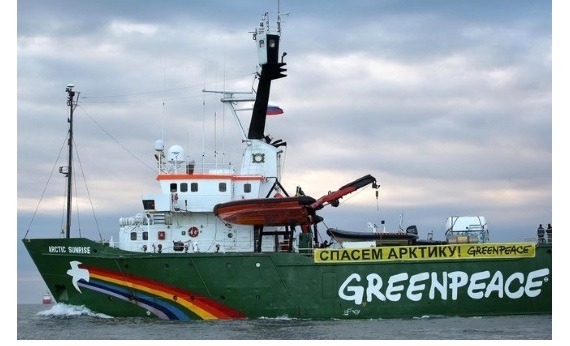Greenpeace
Putin says Greenpeace activists not pirates, but did break law
President Vladimir Putin said on Wednesday Greenpeace activists arrested for staging a protest at Russia's first Arctic offshore oil platform had violated international law but signaled they should not face charges of piracy.

Russian authorities seized the activists' ship and towed it to shore after two tried to scale the rig to protest against Russian plans to drill for oil in the Arctic, which they say poses a threat to the fragile eco-system.
The 30 activists aboard the Arctic Sunrise were due to be questioned on Wednesday, Greenpeace said, a day after Russian investigators said they had opened a criminal case on suspicion of piracy, a crime punishable by up to 15 years in jail.
"It is absolutely evident that they are, of course, not pirates," said Putin, but said the activists had broken international law when they tried to climb the oil platform.
Russia is concerned protests like the one at the Prirazlomnaya platform, owned by state-controlled energy giant Gazprom, could undermine efforts to draw foreign investment and tap rich Arctic resources.
Investigators said the activists, who spent the night behind bars in the far northern region of Murmansk, would be prosecuted, but had not yet been formally charged. They were due to be questioned as suspects on Wednesday.
"All 30 people were sent to different investigative detention facilities in Murmansk and the Murmansk region. Today questioning continues, but lawyers and diplomatic representatives are not allowed to visit the activists," Greenpeace-Russia spokeswoman Tatyana Vasilyeva said.
Greenpeace said the boarding of its icebreaker by Russian authorities was illegal and denied allegations of piracy, saying its activists had conducted a peaceful protest.
The federal Investigative Committee called the protest an "attack" and said it violated Russian sovereignty.
Questioned
Putin, who has promised to increase Russia's military might in the Arctic and stressed its economic importance, said: "Our law enforcement institutions, our border guards didn't know who was trying to seize this platform under the guise of Greenpeace.
"It would have been better if representatives of this organization had sat in this room and voiced their attitude to the issues we are discussing," he said at the Arctic Forum in Salekhard in western Siberia, attended by the presidents of Finland and Iceland and officials from other Arctic nations.
Putin says he does not meddle in criminal investigations but political analysts say his words appear to have influenced decisions by law enforcement agencies and courts in the past.
The Investigative Committee said it questioned three Russian activists on Tuesday and planned to question the remaining foreign protesters after translators were found and it was in the process of providing them with lawyers.
Greenpeace says scientific evidence shows any oil spill from Prirazlomnaya would affect more than 3,000 miles of Russia's coastline.
Onshore drilling is well established in the Arctic, but significant offshore work is in its infancy despite relatively shallow waters and numerous attempts.
A decade of high oil prices, scarcity of opportunities elsewhere and a shrinking ice cap have led companies to look to unexploited parts of the Arctic in recent years.
Global majors including ExxonMobil, Eni and Statoil have agreed deals with Russia's state-owned Rosneft to enter Russia's Arctic offshore waters.
Russia plans to reopen a Soviet-era military base on an Arctic island and bolster its naval presence in the region.
(Published by Reuters - September 25, 2013)